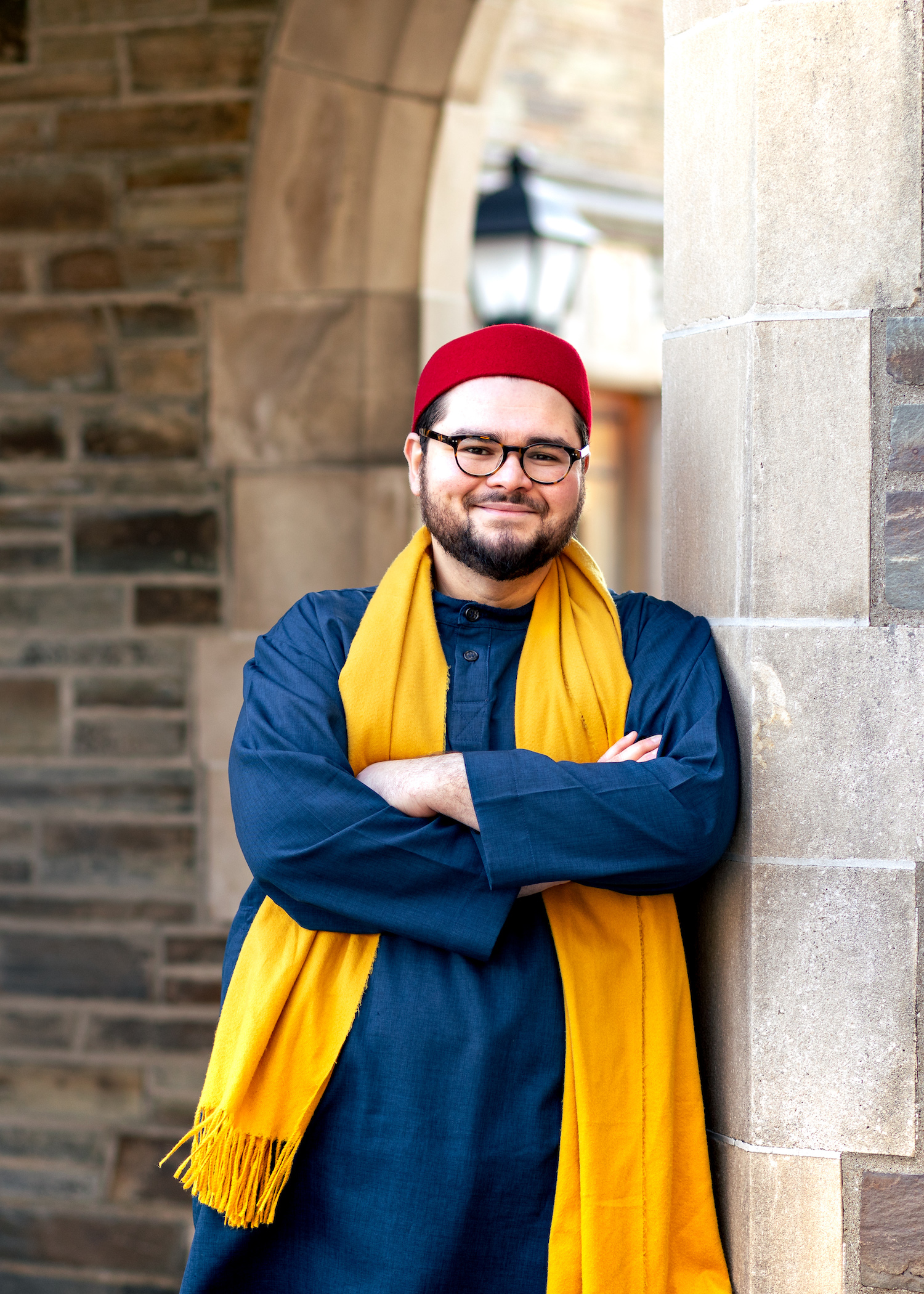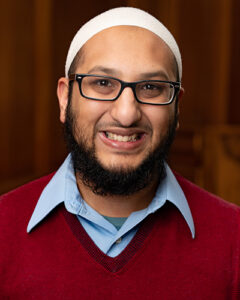Numan serves as the Muslim Chaplain at Cornell University. He joined us in November 2023.
Numan has been a dedicated community servant for the last ten years and has worked extensively as teacher, youth director, community leader, and chaplain with individuals and couples, young and old to help them better understand themselves and their spiritual journeys. He completed his chaplaincy training at the Bayan Islamic Graduate School in Chicago, IL.
Originally born and raised in the Philadelphia area, Numan has been blessed to spend time with a diverse array of people from different cultures and backgrounds throughout the course of his studies and service. Having benefited from both traditionally trained scholarship in the US, Egypt, and West Africa and conventional academic institutions, Numan aspires to bridge the gap between the content of our tradition and the context we are called to apply it within.
He eagerly looks forward to connecting and learning with you!
The Muslim chaplain serves as the point-person for organizing and coordinating religious, spiritual and social activities for Muslims on campus, and contributes to the support system for students, be they Muslims or non-Muslim. The chaplain also serves as a liaison to the Cornell faculty, staff and administration and supports the ecumenical vision and practice of Cornell United Religious Works (CURW).
Principal Duties & Responsibilities
Training
During the formative college and graduate school years, students learn more about themselves as well as their belief systems. This learning can be critical in the development of informed orientations towards Islam.
Cornell’s students hail from every state in the U.S., and as many as one-sixth come from over 120 countries around the world. Graduates go on to occupy leadership positions in both the public and private sectors. The impact of a Cornell education is global, and graduates carry their viewpoints with them into their careers and communities. Thus, it is vital that students leave Cornell better equipped to understand Islam and Muslims.
Muslim students must balance religious life and academic demands, as well as make important personal choices. They may be faced with questions about the rationale behind Islamic viewpoints. Occasionally, students may need help coping with personal trials and tragedies, or coordinating community responses to current events.
Non-Muslim students face analogous challenges, and may also have questions regarding Islam and Muslims. A Muslim chaplain will provide individual counseling and mentoring as well as organize campus programming to address such issues.
Chaplaincy training is focused in 3 areas: pastoral care, religious leadership, and the presentation of an interfaith and intrafaith “face of the community.” College students can display a spectrum of religiosity—from very religious to not at all—which must be accommodated, understood and addressed, with wisdom and maturity. Chaplains are specifically trained to do this. Pastoral care also encompasses psychological and mental health issues, for which an imam has no training. A chaplain offers a professional voice both to and for students, while serving as a resource for all. Both men and women can be chaplains.
An imam typically has training in the area of religious practice. He usually represents one theological perspective within Islam, specific to him.
Before Cornell had a Muslim Chaplain, students received guidance from current and retired Muslim faculty and Ithaca community members. These people, to whom we are indebted, have graciously contributed to campus student life for many, many years.
Yet, they are not responsible for campus Muslim life. They do not have professional training in broadly inclusive religious leadership, faith-based counseling and mental health support that comprises pastoral care and faith representation. They do not get paid to specifically address the spiritual needs of students broadly and individually. They do not emerge from a Muslim-American experience.
A Muslim chaplain serves students full-time. A Muslim chaplain will be there to reach out and touch all self-identifying Muslims, especially those in greatest need. A Muslim chaplain will consider the needs of students proactively, not reactively.
It is Cornell University policy not to fund any faith groups. Support comes from the respective faith communities. There is an umbrella group called Cornell United Religious Work (CURW), which is comprised of approximately 30 chaplains who are privately funded; none are Muslim. As such, the Muslim chaplaincy established by Cornell’s alumni will represent the first of its kind at an academic institution in the United States.
The reality is that we all develop ‘charity portfolios’ for ourselves. Some causes have immediacy, such as a failing school or a natural disaster. Others represent investments.
A Muslim chaplaincy at Cornell represents a worthy investment in students who are in the most formative years of their lives. They have very real struggles with self-identity, family, peers, and social decision-making. Yet, they also represent the most talented minds in the country who will occupy leadership positions throughout the world. Whether they are Muslim or not, their Islamic experience they have is likely to influence the development of their souls and those of many more.
There are causes other than the Muslim Chaplaincy at Cornell that are absolutely worthy of your support. You should engage with them whole-heartedly. You can also support a Muslim chaplaincy at Cornell with comfortable, regular giving, in a way that does not detract from the other worthy causes in your portfolio.
If your Islamic experience at Cornell was wonderful, you have good cause to support a Muslim chaplaincy. If your experience was sub-optimal, you have it all-the-more.
At the conclusion of training, a chaplain typically earns a Master of Divinity. A typical program spans 3 years and involves 72-95 credit hours of coursework. A third of this is spent in clinical pastoral education, or “fieldwork,” which amounts to approximately 400 hours. As such, a chaplain learns to represent and cater to the needs of an entire community. Hartford Seminary offers a Muslim chaplaincy program which combines a Master of Arts in Islamic Studies and Muslim-Christian Relations together with a Graduate Certificate in Islamic Chaplaincy.


